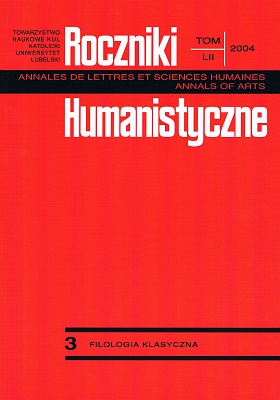Pythagorean Model Of the Perfect Political System
Abstract
In history of philosophy the origin of the first plans of the perfect political system, called an ideal one, or – from the time Thomas More’s Utopia was published – a utopian one, is usually associated with Plato’s philosophy in which the model of the perfect state has its justification in a transcendent principle of reality: in The State – in the supersensible world of ideas; in Laws – in the world of the principles that are inaccessible to the sensual inspection, i.e. ἀρχαί. However, already Aristotle’s testimony points to the fact that the perfect state was written about long before the times of Plato. Studies of the Pythagorean philosophy that originated before Plato, allow the statement that its followers saw the imperfection of the political systems that they knew, and also they knew its causes, which they perceived in infringement by political structures of the principle of universal justice that is omnipresent in the universe. The first plans of the perfect system must have been originated already in the first, so-called old Pythagorean union; however, the state of the writings by the Pythagorean philosophers does not allow their detailed reconstruction. On the basis of fragments and the doxographic evidence that are preserved and recognized as authentic we can only infer that they thought that the state-polis as a microcosmos in its structure should imitate the structure of the universe – the model and pattern of perfection for all beings constituting the universe, which can be reduced first of all to the conviction that in all the aspects of its functioning it should be subjected to the measure, harmony and proportions determined by universal justice.
We find a confirmation of such a conception of the perfect system in the collection of the so-called Pythagorean apocryphal works preserved to our times – works that were written towards the end of the 4th or at the beginning of the 3rd century B.C., and popularized under the names of “old” Pythagoreans (like Charondas, Zaleukos, Archytas of Tarentum, Ocellus, Hippodamus of Miletus, Aresas, Diotogenes, Sthenidas, Ecphantus, Euryphamus of Metapontum), transmitted by late philosophers and compilers, like Porphyrius, Iamblichus or Stobaeus. Since the standpoints of various researchers as to the dating and origin of those writings differ from one another, it should be accepted that they were written either as imitations of the old-Pythagorean writings that have not been preserved, or they developed, according to Pythagorean teaching on the principles and the universe, findings included in the so-called Πυϑαγορικὰ ὑπομνήματα. Among those apocryphal works we find a lot of writings explicitly or implicitly devoted to the question of the perfect political system: the very form of politeia, the authority, status and obligations of the ruler, laws and their sources, the status and obligations of citizens, education, ethical and moral norms. All these writings share acceptance of a definite model for the perfect system: it is the universe and its structure. According to the old-Pythagorean teaching about two principles-ἀρχαί, the universe consists of the rational principle containing proportion and measure (πέρας), and the principle devoid of this measure and proportion (ἄπειρον). In the structure of the universe the rational principle puts its measure and proportion on the irrational principle – which is manifested in the proper numerical relations, in the harmony of oppositions, in the equilibrium of coming into existence and disappearance of all the beings the universe consists of, as well as in the eternal existence and invariability of the very universe. Disturbance of the proper proportions of the structure causes its disintegration. The authors of the pseudo-Pythagorean writings perceive the causes of political upheavals and falls of states in such disturbances of the proper proportions and relations in the field of polis. Hence the perfect political system is one that in the micro scale imitates the correctness of the structure of the universe, which should be manifested in proper relations between the ruler or the authority and the citizens, and in passing proper laws that should be a “translation” of the law of universal justice into the language of human decisions in citizens’ ethical and moral actions.
Hence Pythagorean apocryphal works are a proof that long before Plato philosophers wrote about the perfect political system.
References
Burkert W.: Hellenistische Pseudopythagorica, „Philologus” 105 (1961), s. 16-43, 226-246.
Diels H., Kranz W.: Die Fragmente der Vorsokratiker, Zürich–Hildesheim 198919.
Diels H.: Doxographi graeci, Berlin 1879.
Gajda J.: Prawo natury i umowa społeczna w filozofii przedsokratejskiej, Wrocław 1986.
Gajda J.: Sofiści, Warszawa 1989.
Gajda-Krynicka J.: Filozofia pitagorejska w nurcie fizyki przedplatońskiej. Pitagorejska koncepcja zasady-arche, „Przegląd Filozoficzny” 10 (2001), nr 2, s. 37 nn.
Ioannis Stobaei Anthologium, rec. C. Wachsmuth et O. Hense, vol. I-II: Eclogae Physicae et Ethicae, rec. C. Wachsmuth, vol. III-V: Anthologii libri duo posteriores, ed. O. Hense, Berlin 1894-1912 [I-II – 1884; III –1894; IV – 1909; V –1912] (przedruk: 1958).
Reale G.: Historia filozofii starożytnej, t. IV, przeł. E.I. Zieliński, Lublin 1999.
Richter H.: Geschichte der pythagoreischen Philosophie, Hamburg 1826.
Thesleff H.: An Introduction to the Pythagorean Writings of Hellenistic Period, Åbo 1961.
Thesleff H.: The Pythagorean texts of the Hellenistic period, Åbo 1965.
Timpanaro Cardini M.: Pitagorici. Testimonianze e Frammenti, Firenze 1958.
Wehrli F.: Die Schule des Aristoteles, Basel 1969.
Wehrli F.: Peripatos bis zum Beginn der römischen Kaiserzeit, [w:] Die Philosophie der Antike, Bd. III: Ältere Akademie. Aristoteles. Peripatos, hrsg. von H. Flashar, Basel 1983.
Copyright (c) 2004 Roczniki Humanistyczne

This work is licensed under a Creative Commons Attribution-NonCommercial-NoDerivatives 4.0 International License.





